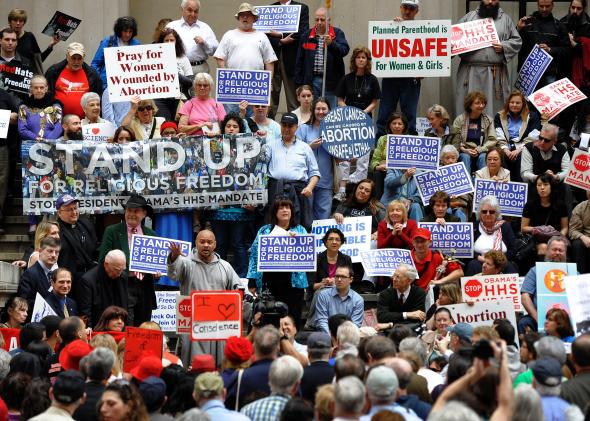Monday’s Supreme Court decision in Burwell v. Hobby Lobby is, at best, a muted victory for the anti-choice movement.* The decision exempts “closely held” corporations from offering insurance coverage of contraceptives. The court argues this won’t create a major burden for female employees, since alternative solutions can be found. Indeed, as the court noted, Health and Human Services already has a workable fix in place to help employees of religiously affiliated companies secure contraception coverage. This solution simultaneously exempts the employer from offering plans that cover contraceptives, while requiring the insurance company to sidestep the employer and offer coverage directly to the employee—who, after all, bought and paid for her own insurance by working. In his opinion, Justice Samuel Alito suggests that employees of “closely held” corporations could benefit from a similar deal:
In fact, HHS has already devised and implemented a system that seeks to respect the religious liberty of religious nonprofit corporations while ensuring that the employees of these entities have precisely the same access to all FDA-approved contraceptives as employees of companies whose owners have no religious objections to providing such coverage. … according to HHS, this system imposes no net economic burden on the insurance companies that are required to provide or secure the coverage.
Although HHS has made this system available to religious nonprofits that have religious objections to the contraceptive mandate, HHS has provided no reason why the same system cannot be made available when the owners of for-profit corporations have similar religious objections.
There might be a short-lived victory on the right over this—until it sinks in that insured women will continue to have their contraceptives covered by the insurance they’ve paid for, regardless of their bosses’ opinions on the matter.
That’s why I see this entire thing as something of an embarrassment for the religious right. Ever since the lawsuits began over the HHS contraception coverage mandate, the claim has been that the attacks are not about sex but about religion—which presumably has broader implications than simply resenting women’s sexual liberation. But this decision limits the employer’s religious reach exclusively to judgments about the employee’s personal use of her own vagina, and no further. “This decision concerns only the contraceptive mandate and should not be understood to mean that all insurance mandates, that is for blood transfusions or vaccinations, necessarily fail if they conflict with an employer’s religious beliefs,” Alito writes.
This feels like an extremely reductive view of religion: As simply a way to codify reactionary beliefs about human sexuality. Or, as Atrios put it on Twitter, “religion is now only about unapproved fucking.” And it’s ultimately not good for the religious right to have one of its own—Alito—limit the scope of legitimate religious grousing to matters of sexuality, as if religion has nothing else going for it. Hobby Lobby may have won this battle. But it won at the price of portraying the Christian right as little more than a movement of sex-obsessed busybodies.
*Correction, June 30, 2014: This post originally reversed the names of the parties in the Supreme Court case Sebelius v. Hobby Lobby, which was handed down as Burwell v. Hobby Lobby, renamed for Kathleen Sebelius’ successor at Health and Human Services.
